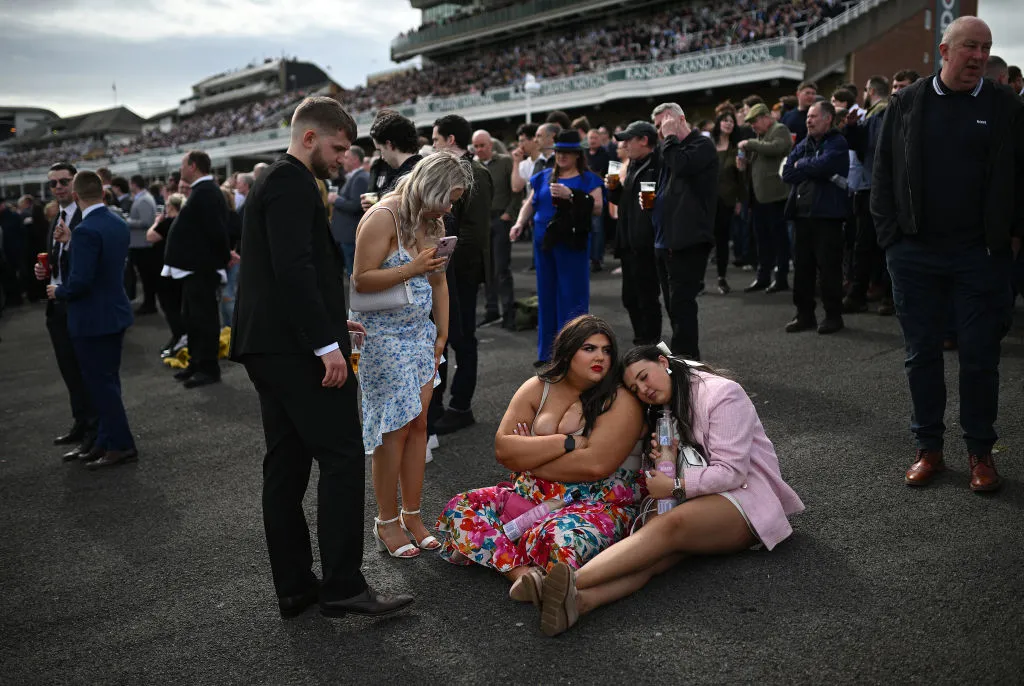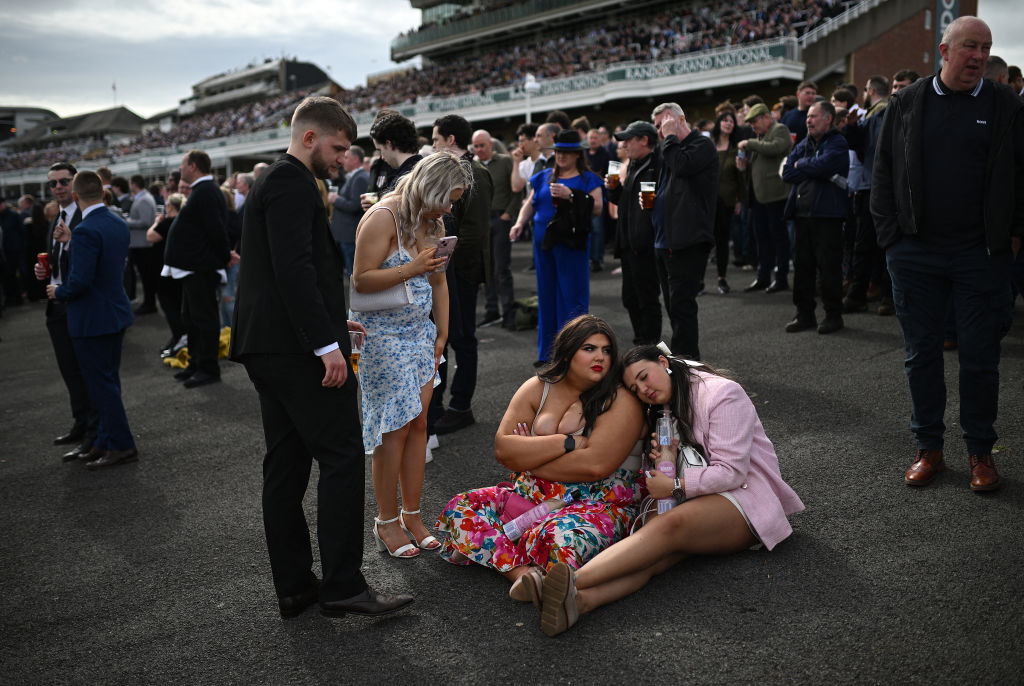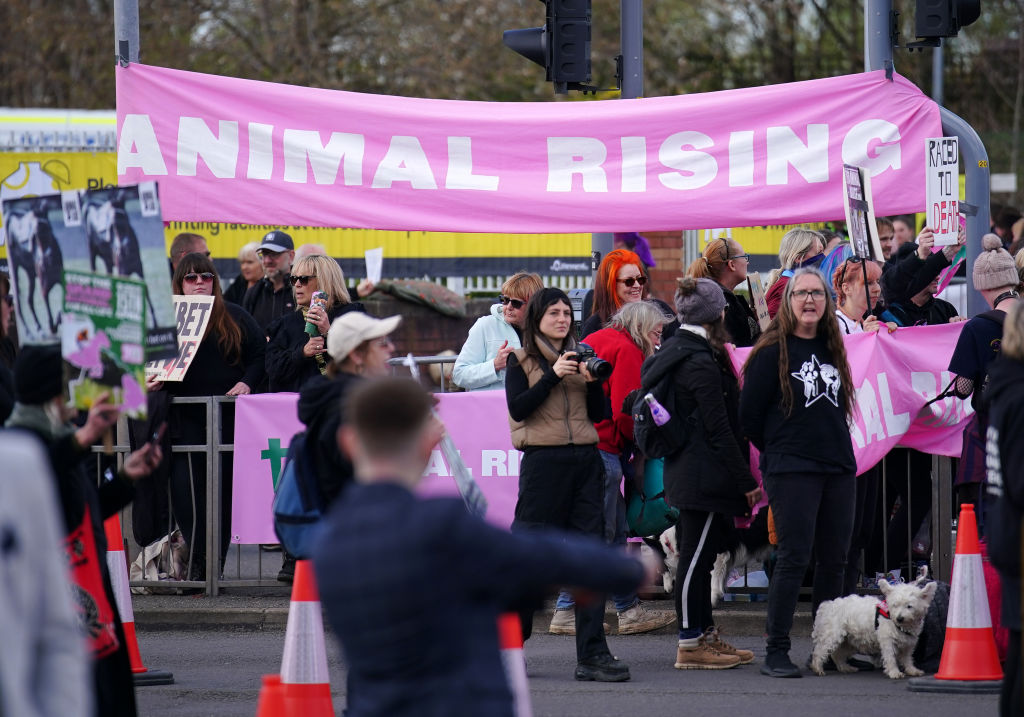Animal cruelty. £7.20 Carling. When will the Grand National pay for its crimes?

‘The safest bet is that a horse will die’
Dear readers — it’s Grand National weekend. One of the most iconic and beloved events in the Merseyside calendar. Fascinators, Pimms and punters of all generations winning big and drinking bigger; a joyous celebration for the best dressed folk in town, high on life and bonhomie…
Plus Jack; sworn enemy of horse racing and the most underdressed and miserable man at Aintree. We sent him along to see if he could get into the spirit of things. Fair warning: he couldn’t.
Editor’s note: Much like buying a watery pint of lager at the Grand National, running a media company isn’t cheap. If you want to support local media and pay for us to go on more jollies to horse racing events, as well as the investigations and the other less important stuff (on which front — eyes peeled tomorrow morning) then do consider giving us your support. It costs £7 a month: a bargain!
Your Post briefing
West Kirkby’s sea wall has been called a “spectacular” failure by a local councillor after it failed to prevent flooding during a storm this week. Lib Dem councillor Stuart Kelly has since called for an investigation into why the “very expensive sea defences” failed to stop homes and businesses flooding during a storm on Tuesday, which saw staff at a seafront bistro rescued and damage to numerous cars. The sea wall cost nearly £20 million to build and was completed in 2023 — at the time, Wirral Conservative councillor Andrew Gardner called the project a “white elephant”.
The Baltic Triangle’s own Frank Abagnale Jr is at it again. Last week we published a piece about Fenir Saba, a conman who swindled numerous people in Liverpool out of thousands of pounds through various property and luxury goods schemes. After our article readers reached out to inform us that Saba already has a new business in the works. FSJP Properties appeared on Companies House over the weekend, with Saba named as director alongside another man, Joseph Proops, from Hampshire. We wonder how this one will work out…
And Liverpool City Council has announced a minute’s silence will be held in Liverpool next week to mark the 35th anniversary of the Hillsborough tragedy. The silence will begin at 3.06pm on Monday — the time the football match was stopped — in memory of the 97 people who died. After the silence, a bell will toll 97 times in tribute to each victim.
Stand up and be counted: Thanks to everyone who has already filled out our survey. We’re really keen to know more about who reads us, what you like, and how we could make The Post better. Just head to the survey here — it should only take 5 minutes. (Very early birds spotted a couple of references to Sheffield in the survey, after certain questions were copied over from our sister title there. The person responsible has been given a formal warning…)
Animal cruelty. £7.20 Carling. When will the Grand National pay for its crimes?
By Jack Walton
There are swarms of enormous hats; fascinators in the carriage. There will be sniffer dogs on the platform. These are the multitudes of Aintree. One woman on the incredibly overcrowded train into Lime Street removes her hat and clutches it close to her as she makes her way along the carriage, like she’s transporting a ming vase through a gorilla enclosure.
Not able to bear the tension as she ducks and weaves through the other wide-brimmed hats, as well as the JD bag boys and the rest, I stare down at my phone and attempt to evaluate the factors that might shape the outcome of the big handicap steeplechase in two days’ time. The many granular details which, if I paid them enough attention, might just make me rich. Chemical Energy likes good ground. Vanillier prefers good to soft. Chambard is a softie through and through. Like me.
Full disclosure: I hate horse racing. I think it’s cruel and I hate it. I’m not generally one for causes. I only became a vegetarian when I was 15 to win an argument with my brother (the nine years since have been a masterclass in stubbornness). But horse racing I do not like.
So, as above, I hate horse racing. Which is why I’ve spent £52.50 on the company card plus rail expenses to head to Aintree for the opening day of the biggest event in the horse racing calendar: the Grand National. I will be the most underdressed person at Aintree (with the exception of the 14-year-old boy in a Diadora tracksuit with an unamused looking mum) and I will wear the longest face. I’m going on a hater safari.

That said, I do have some mixed feelings about this particular race, and not just because my beloved nan was partial to a flutter. This is in some ways the least horsey of the horse races (at least the ones people have heard of) and for that reason — I think — it has been singled out for extra criticism down the years.
Take the Daily Mail’s coverage, which oscillates between betting industry propaganda and hyperfixation on the attendees’ skirt lengths. In 2019 their coverage was so one-track-minded (it’s a wonder they don’t send a reporter along with a tape measure) the Echo published an open letter begging them to “leave our girls alone”.
You don’t get this so much with, say, Cheltenham, or Ascot. And thus it’s hard not to wonder if the annual chorus of calls for the Grand National to be banned include at least a fraction of snobbery. You don’t get it so much with the Gold Cup, because the Gold Cup is part of the English establishment calendar, making it essentially unbannable.
I arrive — it’s even hotter in the Festival Zone than it was on the train. Good day for it. £7.50 pint of Atlantic and a copy of the Racing Post under my arm I make a beeline for the Red Rum Garden.
“There was only five runners there, I couldn’t believe it,” a man called John says. He’s in terrible jeans and a tan blazer. “Why were there only five runners?” he repeats, ratcheting up the incredulity a few notches. I nod sagely before realising that this is a question about a race he’s just watched. It seems John has mistaken me for a racing journalist and — not wanting to reveal the truth about my chosen area of journalism (writing about things I hate, it seems) I tell him I’ll “ask about”. On asking John about the events of last year, in which four horses died at the Grand National, the woman next to him does an exaggerated yawn. Suitably put in my place, I shuffle away to get the bottom of this (apparently) small field of horses.
Leanne, at the other end of the Red Rum Garden, is more willing to engage with the ethical matters of the day. She says she’s pleased that changes have been made this year to try and make the race safer (fewer horses in the big race, an earlier first hurdle to reduce the pace at which horses reach it, making them less likely to fall) but that the national is an important local tradition. “It’d be sad to lose it,” she says. “It’s not like it’s the only race”.

Well. If you ask the activists there are specific reasons that Aintree gets so much flak. “The Grand National is cartoonish in its cruelty,” says Nathan McGovern from Animal Rising. For one, it features an unusually large number of horses. Last year had 40, this year will have 34. But 34 is still well above the average, and — according to the likes of McGovern — well above what’s safe. It’s also very long. Dene Stansall, a “horse welfare consultant” from Animal Aid, tells me the length of four miles is well above what’s safe for any horse to be running. “A horse running from a predator may run a mile tops,” he says. “They’re pushing them to their physical limits. It’s sheer cruelty”.
Last year Animal Rising decided to do something about that cartoonish cruelty. They delayed the big race by 15 minutes by vaulting fences, entering the track and attaching themselves to various objects.
Britain doesn’t tend to look favourably on millennials in brightly coloured t-shirts glueing themselves to things, but whatever the public made of all the glueing and the vaulting, the consensus in the wake of that race was that horse racing is cruel. A YouGov poll had 54% of respondents rating the race as “very” or “fairly” cruel, with 15% more in the don’t know camp. Four horses died at last year’s event, taking the total to 63 since the turn of the millennium. But in spite of this, and the momentum they built, Animal Rising are insistent they won’t be back this year.
"Never say never. But is disrupting races going to be the most effective way to end horse racing? We think not, because we think the public has already made that decision for themselves,” said Nathan McGovern in a statement.
I’d heard differently though, and that the real reason Animal Rising wouldn’t be in attendance was due to the very disruptive and convoluted legal entanglement they’d gotten into with the Jockey Club (the Jockey Club are the biggest commercial horse racing organization in the country, owing 15 racecourses including Aintree).

Latest
Trust in vaccines has fallen post-COVID. Now Knowsley has a measles outbreak
A Liverpool developer became a Dubai crypto kingpin. Now he’s accused of defrauding investors out of $400 million
Is Liverpool on track for net zero by 2030?
Just what is a “public space” in Liverpool?
Animal cruelty. £7.20 Carling. When will the Grand National pay for its crimes?
‘The safest bet is that a horse will die’